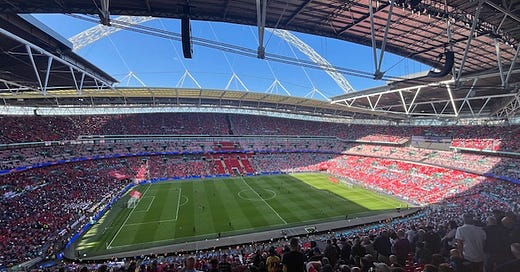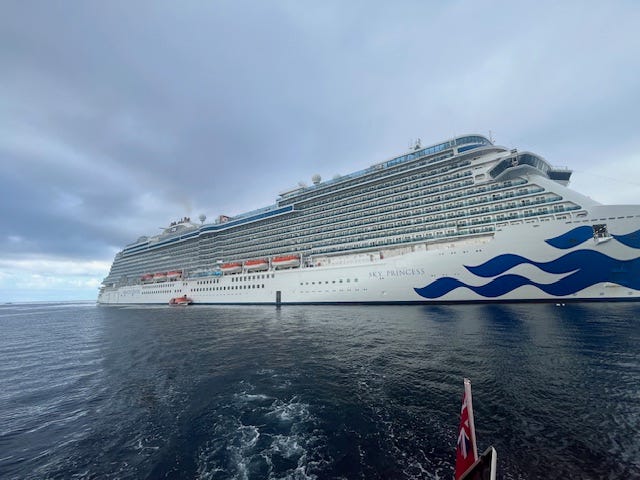Glad All Over
A cruise, a football match, and the contradictions of loving the world while it burns
I don’t know what to write about.
That’s a strange thing to admit, here of all places. Since Dad died, the words have been slower, heavier. My thoughts feel like bees trying to fly through smoke. They are still there, buzzing, purposeful, but muddled and uncertain which direction is up. I used to get fired up about species loss, soil health, and government schemes so baffling they could double as riddles. But now? It’s hard to get angry about the new Planning and Infrastructure Bill (and it’s bad, really bad) when your world’s axis has tilted.
It will come back. I know that. The fight, the fire, the clarity. They’re under the surface somewhere, crouched behind grief, waiting for the right moment to uncurl and stretch.
In the meantime, let me tell you about a cruise and a football team.
Yes, sorry, that’s probably not what you signed up for. This isn’t a post about regenerative farming or chalk streams or the latest biodiversity metric. This is a post about a massive floating buffet of contradictions.
The cruise was booked by my Dad before he died as part of his grand retirement plan to travel the world and invite a little glamour into his life. It was less about the ports of call (though Sardinia was, to be fair, gorgeous) and more about the entertainment, specifically, Anton Du Beke, from Strictly Come Dancing. My Dad adored musical theatre, sequins, and unrelenting jazz hands. So of course, we boarded a ship where Anton himself would be performing.
When we opened the door to our cabin, there it was - an envelope with Dad’s name on it, holding all the show tickets he’d planned for the first week, like a ghost of his joy.
I’d never cruised before. I think I expected something sedate. Nautical stripes, maybe. Afternoon tea. A game of bingo or two. What I got was Las Vegas with lifeboats. A vertical city of 3,800 people, with lifts, casinos, theatres, nine restaurants, three swimming pools, a spa, a hair salon, and shops selling gold jewellery at “duty-free” prices. The air conditioning hummed eternally and was impossible to turn off. It is, frankly, a marvel of human engineering and a dystopian nightmare all at once.
I ate plate after plate of food at the all-you-can-eat buffet while children starved in Gaza. I stared out at golden sunsets from our balcony, the sea stretching infinite and unknowable and yet I knew the ship’s engine noise was disorienting whales, disrupting migratory patterns, turning the ocean into a hostile maze of vibrations and sonar.
Cruises, it turns out, are one of the most carbon-intensive ways to travel. One large cruise ship can emit more sulphur dioxide in a year than a million cars. The sheer energy it takes to run a floating city - fuel, food refrigeration, desalination, lighting, lifts, endless buffets - is staggering. Ships like ours release millions of litres of sewage into the sea each day, and the black carbon from their fuel settles on Arctic ice, speeding its melt. It’s like gilding a stage while the foundations slowly rot.
The irony of going on a cruise is not lost on me. My working life is devoted to nature recovery. To helping farmers restore habitats, to building landscapes where wildlife can return, where our relationship to the land is healing, not extractive. I spend my days advocating for regenerative farming, private investment in nature markets, and restoring rivers. And there I was, in a floating emissions factory, clapping to dancers in cowboy hats as they tap-danced on tabletops.
I haven’t flown in over eight years. Not because I’m trying to win some moral gold star, but because it felt like one small thing I could do. Aviation accounts for around 2.5% of global CO₂ emissions, but because of other greenhouse gases and high-altitude effects, the real impact is closer to 3.5% of global warming.
And for me, not flying didn’t feel like a sacrifice. I have Peggy, a 1990 charmingly temperamental VW campervan, and a dog, Dougie, who prefers forests to departure lounges. Most of my holidays are just the three of us: me, the dog, the van. We drive to windswept moors, the cliffs of Pembrokeshire, and the pony-strewn commons of the New Forest. The kind of places where you’re more likely to find a cow than a cocktail.
And yet, here I was. On a ship that probably burned more fuel in a day than Peggy does in a year. Watching musicals. Drinking cocktails. Thinking of Dad, constantly. And trying not to cry when Tony Hadley from Spandau Ballet sang ‘Gold’ because that song used to echo through Selhurst Park before every Crystal Palace match.
Dad was a lifelong Palace fan. He was the kind of fan who went in the rain, in the cold, in the years when we lost more than we won. Gold wasn’t just a song it was part of a ritual. It was standing shoulder to shoulder with strangers in scarves, willing your team to do something miraculous.
And Crystal Palace did indeed do something miraculous. As soon as I got off the ship on Saturday morning, I drove straight to Wembley. Still smelling faintly of cruise buffet and sunscreen, I stood among thousands of fans to watch Dad’s beloved Crystal Palace finally win the FA Cup. After all those years of near-misses and heartbreaks, they did it. Without him. And yet, somehow, entirely because of him. It felt like the universe cracking open just wide enough to let him slip through and see it.
The past month has felt like a dream stitched together with contradictions: salt air and stage lights, grief and glitter, loss and wild, unfiltered joy.
And it left me thinking, as I so often do, about how we make sense of a world that doesn't quite line up. I kept asking myself: how do I hold this? How do I balance joy and grief, necessity and impact, memory and responsibility?
I can’t make this make sense. I can only say that it all felt necessary. The cruise. The game. For us. For my Mum. For the space they carved out of the world’s noise, where grief could soften a little under stage lights and warm sea air, then lift in a stadium roar as red and blue flags waved above our heads. We were wrapped in the absurd, beautiful comfort of doing all of Dad’s favourite things, together, in the aftermath of his absence.
And still, the questions linger. Joy doesn’t cancel out consequence. Love doesn’t neutralise carbon. The contradiction remains - how to live well in a world where every action has a footprint.
I am trying to live in that tension. To be honest about it. To let myself feel joy, even as I reckon with its cost.
At Wembley, surrounded by thousands of strangers in scarves, arms raised and hearts wide open, I sang ‘Glad All Over’ at the top of my lungs. Loud, messy, tear-soaked.
And for a moment, it all made perfect sense. The cruise, the glitter, the guilt. The tap routines and the sunsets. The climate contradictions and the quiet acts of love.
I can’t undo the contradictions - Sequins. Soil. Tap routines. Tree planting. A cruise. A football match. A life. I can’t unburn the fuel. I can’t bring him back. But I can show up with my grief and my guilt and my sequins and my scarf.
And I can sing.
Loud. Messy. Tear-soaked.
Glad all over.






Thank you for writing this.
I once read a novel called A Gentleman in Moscow and I made a note of these lines. The writer is referring about the main character who has lost a loved one.
“[the character in the book] can never again walk Neskey Street without feeling an unbearable sense of loss. And that is how it should be. That sense of loss is exactly what we must anticipate, prepare for, and cherish to the last of our days; for it is only our heartbreak that finally refutes all that is ephemeral in love.”
I'm not sure we're meant to undo the contradictions. I lost my mum when I was a child, and I've lived a long time in death's strange shadow. Yet life continues to be good in so many remarkable ways.
I love this insight from Francis Weller's The Wild Edge of Sorrow: "The work of the mature person is to carry grief in one hand and gratitude in the other and to be stretched large by them. How much sorrow can I hold? That’s how much gratitude I can give."